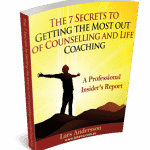Is there something wrong with you… or are you simply an introvert?
 In my work as a counsellor & psychotherapist it happens quite regularly that a client comes to see me because they feel out of place in social situations, and think there is something wrong with them, since they are not the way most other people seem to be. Many times these clients have gone down a path of self-doubt of a kind that has led them into depression. Yet, once we start talking, it turns out that they are simply an introvert who has acquired a skewed perspective of what other people are actually like.
In my work as a counsellor & psychotherapist it happens quite regularly that a client comes to see me because they feel out of place in social situations, and think there is something wrong with them, since they are not the way most other people seem to be. Many times these clients have gone down a path of self-doubt of a kind that has led them into depression. Yet, once we start talking, it turns out that they are simply an introvert who has acquired a skewed perspective of what other people are actually like.
This is of course easy to do, when you live in a culture where extroversion is the dominant and most celebrated personality type. In the majority of Eastern cultures, being more contemplative, quiet and serene is encouraged and highly respected. The Western culture, on the other hand, tends to favour people who act quickly, are outgoing and take up a lot of social space.
And obviously, if the social space is dominated by extroverts, it will appear as if that is how most people are – and that if you are not like them, then there is something wrong with you. But really, there are approximately as many introverts as there are extroverts. It’s just that the introverts don’t make so much ‘noise’ and hence appear to not be there to be counted.
Which is better; extrovert or introvert?
In absolute terms, there is no grounds for saying that extroversion is better than introversion, or the other way around. It simply depends on the circumstances. There are certainly situations where there is an advantage to being an extrovert. But there are equally situations where being an introvert is more valuable.
In situations where being seen and noticed is, in and of itself, the most important, the extrovert wins hands down. But once they have been noticed, what then? Unless they have also got up their sleeve some of the typical qualities of an introvert, the extrovert may struggle if the situation then requires creating a deeper connection with someone.
In the realm of finding a partner and forming a relationship, for example, the extrovert may very well be outstanding when it comes to drawing the attention to themselves and getting the initial conversation started. But just a short step beyond the start of an initial conversation is when the introvert begins to excel. It’s a bit like the hare and the tortoise, really.
Real, quality connections between people are created when they go a bit deeper than the immediate surface contact, when they begin to share who they truly are in a more intimately personal way. That’s where the introverts are at home. And that’s where extroverts can learn from introverts how to be more comfortable. In particular when they are seeking to form a meaningful relationship.
What introverts do well
Both extroverts and introverts all have the “full piano keyboard” of human behaviour at their disposal for expressing themselves. They just have different degrees of comfort with the different “chords” that can be played. Again, I am not arguing the point here that any one particular approach is better than the other, only that in the arena of creating a meaningful relationship what comes natural to an introvert is often highly valuable.
Listening
Introverts typically listen more than they speak. They are naturally reflective, so they listen attentively to what you have to say, reflecting on it and mulling over it before they respond. And when they respond, you can expect that they have thought through their response before delivering it.
Talking
Introverts enjoy deep and meaningful conversation. They would rather talk about values than about the weather. They love talking about matters they are passionate about, matters that give them fulfilment. Once they feel safe to open themselves to you, they will share about their own deeper inner truths. And when you respond in kind, a strong connection can form that makes it feel as if you have known each other for years, even though you may have just met.
Authenticity
Introverts are not usually the kind of people who do well selling used cars, particularly if the cars are of questionable quality. They are not known for their ability to hype things up, to put a spin on reality and make something sound better than it is. They more so speak from what they, in their self-reflecting, have found is true within themselves.
Sensitivity
As introverts often take more time to reflect on what is before them, they tend to be more sensitive to what others are feeling, and may empathically feel what another is feeling. You can therefore expect to experience strong emotional connections with an introvert.
Bear in mind, though, that high sensitivity is not always a good thing. When someone is highly sensitive, they run the risk of being overwhelmed, and may need to shut down somewhat in order to cope. And then the emotional connection may suffer. At least temporarily.
Closeness
Introverts excel at closeness. They are fulfilled by intimate connections – ‘intimate’ meaning being close and personal – and they want to dig right in to find out what is to be found on the deeper levels, beyond the shallow surface. They will ask you questions about your inner world; thoughts and feelings. Sometimes this can be challenging, if you are not used to it, but the end result – when this goes both ways between two people – is a closeness that greatly surpasses the everyday experience.
Having close and personal connections requires an investment of time and attention, however, so introverts typically don’t pursue interactions with a great number of people. They rather, typically, only open up to a chosen few, yet to them they will open their soul.
Delayed gratification
One of the measures of maturity is considered to be an person’s ability to delay gratification. This is something that comes naturally to introverts, as they are not usually very impulsive, but rather prefer spending time thinking things through. Reflecting before taking action, may then lead to the choice of making a short-term sacrifice in order to achieve greater things in the long term – for themselves as well as for those they are involved with.
Solitude
While introverts certainly have a tendency to withdraw and spend time in solitude, this does not contradict their ability to form meaningful relationships. Their alone-time is not spent staring blankly at the wall or the TV. Introverts are always reflecting, and much of the reflecting is about how they can improve themselves and their life, including their relationship.
So, what about you – are you an introvert?
Have you ever thought about yourself that you are “weird” or that there must be something wrong with you, because you don’t seem to be like everyone else? Perhaps it is worth considering that you may just be a bit – or a lot – introverted.
And if you, on top of that, are struggling to find a partner to have a meaningful relationship with, what I would suggest is that you need to choose a very different approach to be successful in that venture, than you would if you were an extrovert.
You will need to learn to truly value and honour your own way of being, and you will need to develop your courage and comfort in standing up as you are, when you meet with others. Only then will you be able to easily attract the right partner into your life.
As someone said, “Introverts can be insanely attractive. It just might take some time and effort to get them to open up.”
If you recognise yourself in the above – whether you are looking for a partner or not – perhaps you will want to explore further how you can build more confidence in yourself, as the person that you are, instead of wasting energy on trying to be someone that you are not. Then contact me today to have a chat about how I can be of help to you.
This article was first sent out as an issue of Authentic Living! – the newsletter for Integrating Awareness. Not all newsletters are reproduced on my website. To make sure you don’t miss out on something interesting, subscribe now – it’s free!

